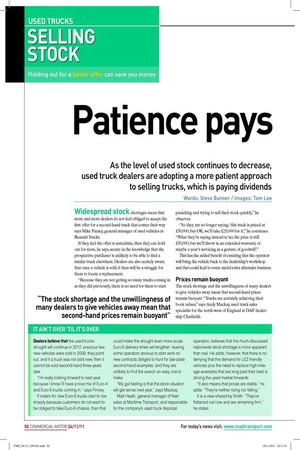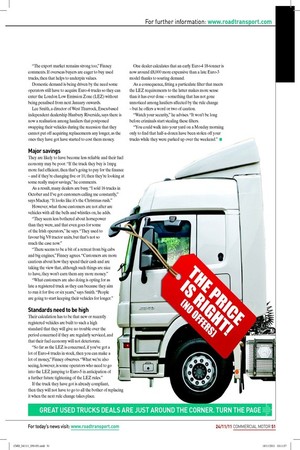Patience pays
Page 42

Page 43

If you've noticed an error in this article please click here to report it so we can fix it.
As the level of used stock continues to decrease, used truck dealers are adopting a more patient approach to selling trucks, which is paying dividends
Words: Steve Banner / Images: Tom Lee Widespread stock shortages mean that more and more dealers do not feel obliged to accept the irst offer for a second-hand truck that comes their way says Mike Finney, general manager of used vehicles at Renault Trucks.
If they feel the offer is unrealistic, then they can hold out for more, he says, secure in the knowledge that the prospective purchaser is unlikely to be able to ind a similar truck elsewhere. Dealers are also acutely aware that once a vehicle is sold, it then will be a struggle for them to locate a replacement.
“Because they are not getting so many trucks coming in as they did previously, there is no need for them to start panicking and trying to sell their stock quickly,” he observes.
“So they are no longer saying, ‘this truck is priced at £30,000, but OK, we’ll take £25,000 for it’ , ” he continues. “What they’re saying instead is ‘no, the price is still £30,000, but we’ll throw in an extended warranty or maybe a year’s servicing as a gesture of goodwill’ . ” This has the added beneit of ensuring that the operator will bring the vehicle back to the dealership’s workshop and that could lead to some useful extra aftersales business.
Prices remain buoyant
The stock shortage and the unwillingness of many dealers to give vehicles away mean that second-hand prices remain buoyant. “Trucks are certainly achieving their book values,” says Andy Mackay, used truck sales specialist for the north-west of England at DAF dealership Chatields. “The export market remains strong too,” Finney comments. If overseas buyers are eager to buy used trucks, then that helps to underpin values.
Domestic demand is being driven by the need some operators still have to acquire Euro-4 trucks so they can enter the London Low Emission Zone (LEZ) without being penalised from next January onwards.
Lee Smith, a director of West Thurrock, Essex-based independent dealership Hanbury Riverside, says there is now a realisation among hauliers that postponed swapping their vehicles during the recession that they cannot put off acquiring replacements any longer, as the ones they have got have started to cost them money.
Major savings
They are likely to have become less reliable and their fuel economy may be poor. “If the truck they buy is 1mpg more fuel eficient, then that’s going to pay for the inance – and if they’re changing ive or 10, then they’re looking at some really major savings,” he comments.
As a result, many dealers are busy. “I sold 16 trucks in October and I’ve got customers calling me constantly,” says Mackay. “It looks like it’s the Christmas rush.” However, what those customers are not after are vehicles with all the bells and whistles on, he adds.
“They seem less bothered about horsepower than they were, and that even goes for some of the Irish operators,” he says. “They used to favour big V8 tractor units, but that’s not so much the case now.” “There seems to be a bit of a retreat from big cabs and big engines,” Finney agrees. “Customers are more cautious about how they spend their cash and are taking the view that, although such things are nice to have, they won’t earn them any more money.” “What customers are also doing is opting for as late a registered truck as they can because they aim to run it for ive or six years,” says Smith. “People are going to start keeping their vehicles for longer.”
Standards need to be high
Their calculation has to be that new or recently registered vehicles are built to such a high standard that they will give no trouble over the period concerned if they are regularly serviced, and that their fuel economy will not deteriorate.
“So far as the LEZ is concerned, if you’ve got a lot of Euro-4 trucks in stock, then you can make a lot of money,” Finney observes. “What we’re also seeing, however, is some operators who need to go into the LEZ jumping to Euro-5 in anticipation of a further future tightening of the LEZ rules.” If the truck they have got is already compliant, then they will not have to go to all the bother of replacing it when the next rule change takes place. One dealer calculates that an early Euro-4 18-tonner is now around £8,000 more expensive than a late Euro-3 model thanks to soaring demand.
As a consequence, itting a particulate ilter that meets the LEZ requirements to the latter makes more sense than it has ever done – something that has not gone unnoticed among hauliers affected by the rule change – but he offers a word or two of caution.
“Watch your security,” he advises. “It won’t be long before criminals start stealing these ilters.
“You could walk into your yard on a Monday morning only to ind that half-a-dozen have been stolen off your trucks while they were parked up over the weekend.” ■













































